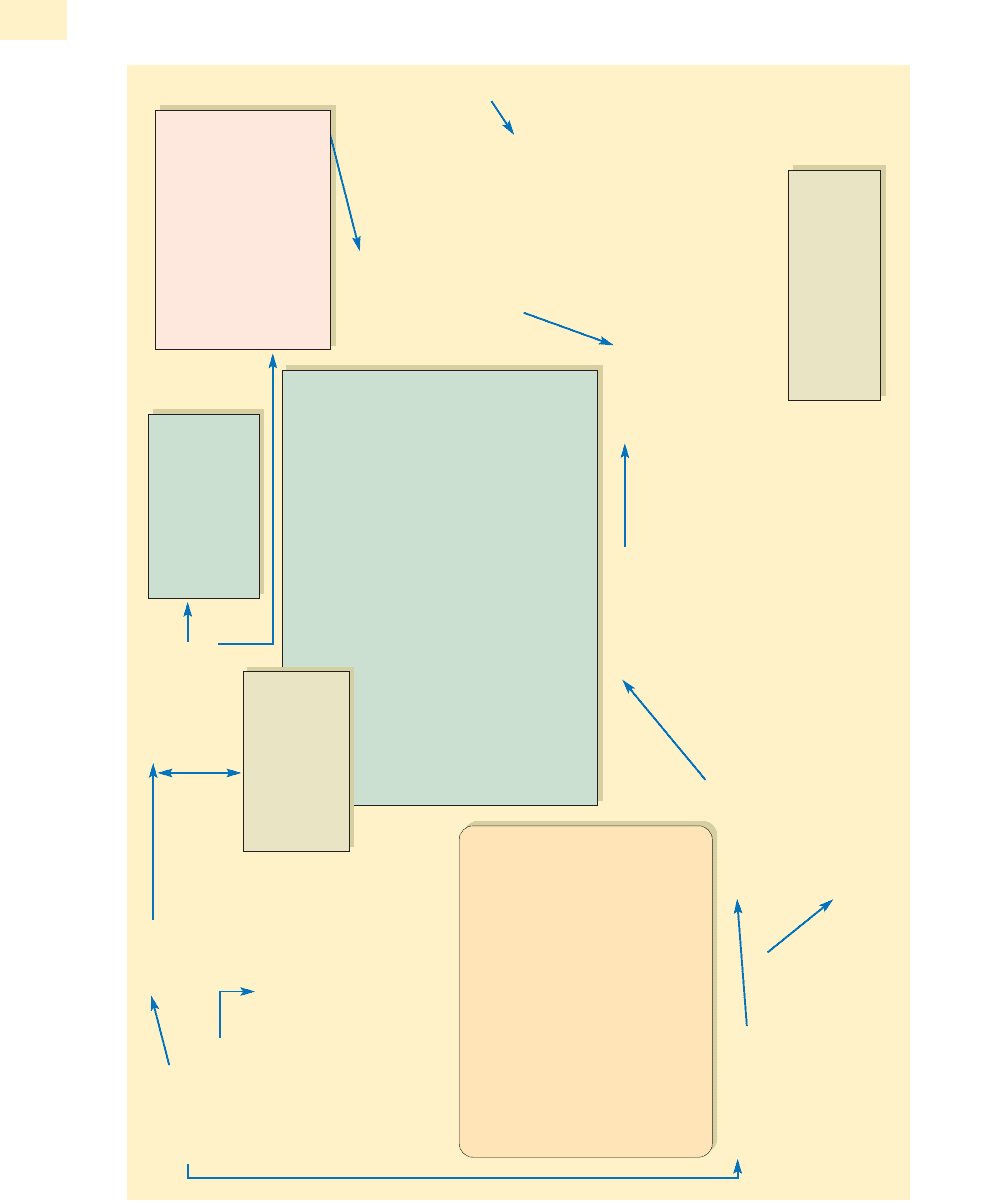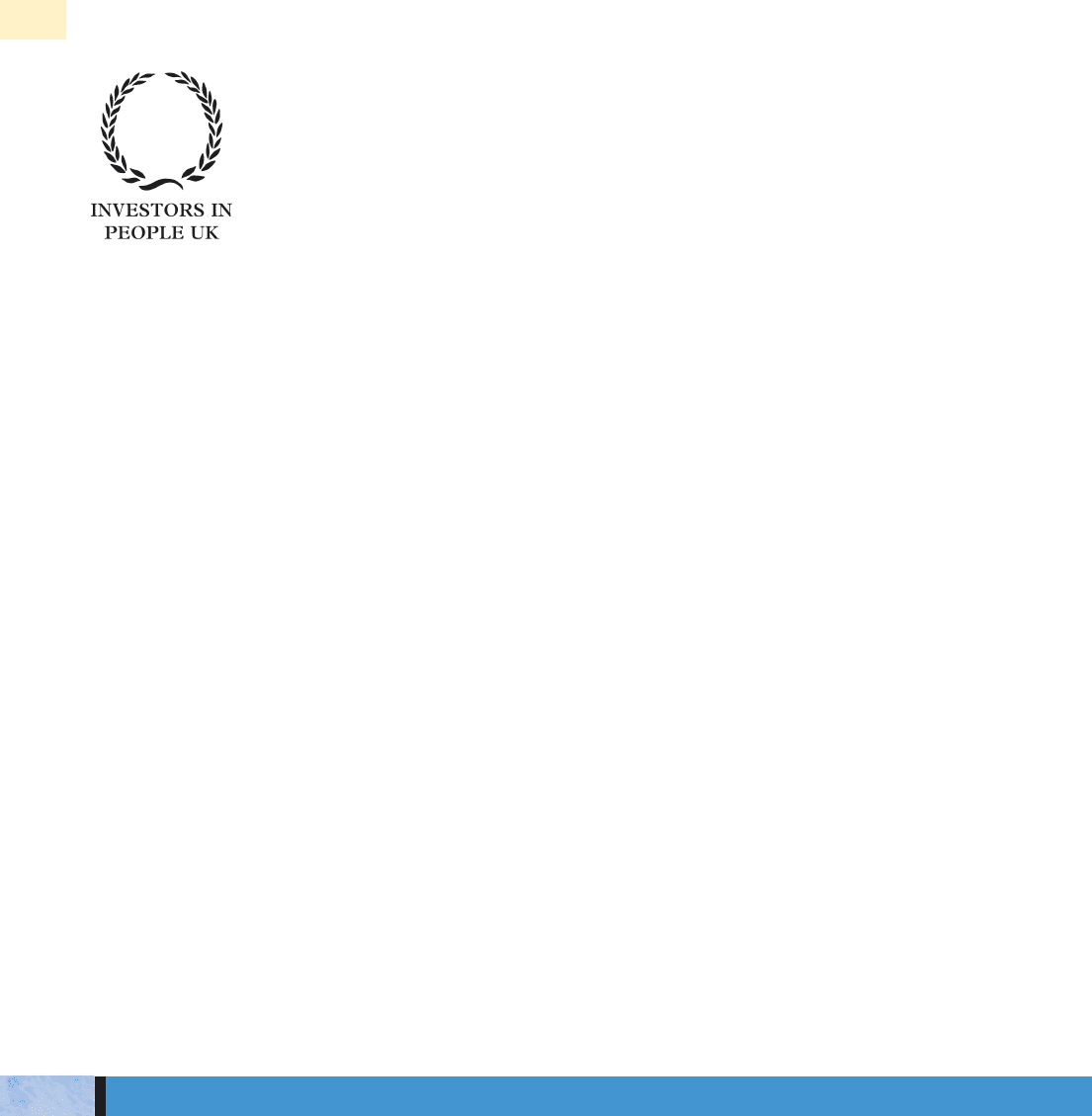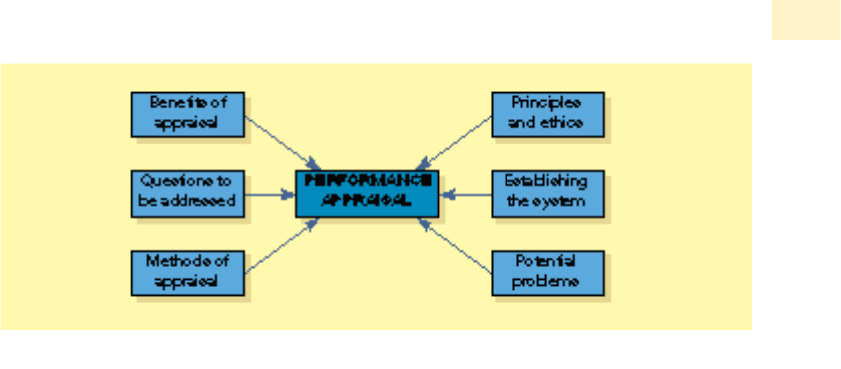Mullins L.J. Management and organisational behaviour, Seventh edition
Подождите немного. Документ загружается.


vation in products or processes this could prove disastrous as they fail to attract the right kind of
recruit. Also the relationship between people and successful strategies goes beyond the tradi-
tional agenda of the HR function and is concerned with behaviours as much as competencies.
17
Whatever the choice of terminology or decisions on organisation, effective HRM and
the successful implementation of personnel activities are essential ingredients for
improved organisational performance. For example, Lynch refers to the importance of
people as a vital resource for sustainable competitive advantage. The smooth-running
man or woman is an essential feature of any company and for some industries people
are not just important but the key factor for successful performance.
18
HR policies and
practices have an important role to play in facilitating the effective implementation of
management processes, such as, for example, total quality management.
19
Ulrich refers to serious and widespread doubts about HR’s contribution to organisa-
tional performance but suggests that it has never been more necessary. The question
for senior managers is not, should we do away with HR, but what should we do with
HR? Companies today face five critical business challenges: globalisation; profitability
through growth; technology; intellectual capital; and change, change and more
change. These challenges provide HR with an opportunity to play a leadership role in
the development of new capabilities to meet the challenges. However, Ulrich main-
tains that HR cannot transform itself alone and the primary responsibility belongs to
the CEO and every line manager who must achieve business goals.
The five challenges present a new mandate for human resource management in order
to help deliver organisational excellence in the following four ways. It should become:
■ a partner with senior and line managers in strategy execution;
■ an expert in the way work is organised and executed to ensure costs are reduced and
quality maintained;
■ a champion for employees, vigorously representing their concerns to senior manage-
ment and working to increase employee contribution and commitment; and
■ an agent of continuous transformation, shaping processes and a culture to improve
an organisation’s capacity for change.
20
A major study undertaken for the CIPD confirms people management issues do have a
tangible effect on profits.
21
Research based on an intensive examination of more than
100 medium-sized manufacturing firms in the UK over seven years reveals that:
1 People management is not only critical to business performance: it also outstrips
emphasis on quality, technology, competitive strategy or research and development
in its influence on the bottom line.
2 Companies whose attitude surveys reported high levels of job satisfaction and com-
mitment among staff showed improving financial performance.
3 Furthermore, HR practices explained nearly one-fifth of the variation between com-
panies in productivity and profitability.
The results strongly support the link between effective people management and strong
business performance.
The report draws attention to appropriate HR practices including:
■ effective recruitment and selection;
■ strategic training and appraisals;
CHAPTER 19 HUMAN RESOURCE MANAGEMENT
755
THE IMPORTANCE OF HRM
New mandate
for HRM
People
management
really matters

■ jobs designed to promote autonomy, flexibility and problem-solving; and
■ favourable reward systems, harmonisation and involvement.
22
Reconciliation of cultures
The practice of HRM is affected by cultural influences and with an increasingly global
environment it is important for organisations to review their HRM policies and prac-
tices. For example, as Schneider and Barsoux point out: ‘Above all, the importance of
HRM practices in creating and reinforcing the corporate culture need to be recognized
in order to assure that desired changes in structures and strategies can be implemented,
both at home and abroad. This is, in effect, the very meaning of strategic HRM and
the reason for its central role in creating strategic change.’
23
Trompenaars and Woolliams discuss the strategic task facing organisations in generat-
ing value through cross-border acquisitions, mergers and alliances, and the role of the
HR professional.
In our experience HR professionals can play a crucial role in the facilitation of a successful recon-
ciliation of cultures. They need to become ‘culture coaches’ facilitating the basic processes of
post-merger and pre-merger integration … The HR community has an increasingly important role
in developing the Trans-culture competence of the individual and the organization through
Culture Due Diligence through which the expected benefits of the strategic, synergistic or intrin-
sic alliances can be delivered.
24
It is not the purpose of this or the following chapter to attempt to provide
detailed coverage of HRM. This is covered well in specialist books on the subject
area.
25
It is important, however, to recognise the broader context in which the
process of management and organisational behaviour takes place and to provide
an insight into particular areas of interest. These include: training and develop-
ment; performance appraisal; employment relations; and (in Chapter 20)
resourcing the organisation.
One major area of the HRM function of particular relevance to the effective manage-
ment and use of people is training and development. Few would argue against the
importance of training as a major influence on the success of an organisation. Staff are
a crucial, but expensive, resource. In order to sustain economic and effective per-
formance it is important to optimise the contribution of employees to the aims and
goals of the organisation. The importance of training as a central role of management
has long been recognised by leading writers. According to Drucker, for example, the
one contribution a manager is uniquely expected to make is to give others vision and
ability to perform. A basic operation in the work of the manager is to develop people
and to direct, encourage and train subordinates.
26
The general movement towards flexible structures of organisation and the nature of
management moving towards the devolution of power to the workforce give increasing
emphasis to an environment of coaching and support. Training is necessary to ensure
an adequate supply of staff who are technically and socially competent, and capable of
career advancement into specialist departments or management positions. There is,
therefore, a continual need for the process of staff development, and training fulfils an
important part of this process. Training should be viewed, therefore, as an integral part
of the process of total quality management. (Management development is discussed in
Chapter 23.)
756
PART 7 MANAGEMENT OF HUMAN RESOURCES
TRAINING AND DEVELOPMENT

The purpose of training is to improve knowledge and skills, and to change attitudes. It is
one of the most important potential motivators. This can lead to many possible benefits
for both individuals and the organisation. Training can:
■ increase the confidence, motivation and commitment of staff;
■ provide recognition, enhanced responsibility, and the possibility of increased pay
and promotion;
■ give a feeling of personal satisfaction and achievement, and broaden opportunities
for career progression; and
■ help to improve the availability, quality and skills of staff.
Training is therefore a key element of improved organisational performance. Training
increases the level of individual and organisational competence. It helps to reconcile the
gap between what should happen and what is happening – between desired targets or
standards and actual levels of work performance. Although many employers continue to
have reservations about the cost and the extent of tangible business returns from train-
ing, the development of vocational skills has been identified as a key factor in
sharpening competitiveness and delivering hard, bottom-line improvement in profits.
28
Investment in people is fundamental to a quality of working life strategy (discussed
in Chapter 18).
This means actively facilitating the learning, growth and development of individuals. An exten-
sive capability and commitment to training must be an integral part of the organisation’s
business strategy. Essential components of the training policy will be:
■ the view that continuous training is the norm
■ the assumption that training will be a life-long process
■ recognition of the need to update existing skills, replace redundant skills and train for
new skills
■ the need for multi-skilling to cope with change.
29
However, although the potential benefits of training may appear obvious, it does not nec-
essarily follow that training, per se, will lead to improved performance. There has to be an
appropriate training culture. Training has to be relevant to the needs and requirements of
the organisation and there is increasing emphasis placed on the value of vocational educa-
tion. For example, Tate acknowledges that training is an important lever to bring about
improvement and change but questions whether individual competence would lead auto-
matically to corporate competence, and emphasises the importance of a sound business
agenda and the distinction between training and education.
Training can easily become an agenda for conformity and the status quo – good at instilling uni-
formity and compliance with someone else’s model of current best practice. Genuine education –
with which training is so clumsily lumped much of the time – is its polar opposite. Education is
liberating and challenging; it offers us choice, because it opens our eyes and our minds. Training
works outside-in; education works inside-out ... Training will only help if organisations learn to
be wise in how they use an individual’s capability, marrying talent with healthy cultures, systems
and processes, serving well conceived business goals.
30
CHAPTER 19 HUMAN RESOURCE MANAGEMENT
757
Skills shortages are often the result of short-termism and little or no analysis of present or
future training needs … Keeping skilled workers is one of the first business goals.
Sir Brian Wolfson, Chairman of Investors in People UK.
27
The benefits
of training

Training should be viewed as an investment in people. This is important at any time,
but particularly so with the increasing pace of technological, structural and social
change. But training for its own sake achieves little. It must be real, operational and
rewarding. Training requires the co-operation of line managers, adequate finance and
resources, time, skilled staff and a supporting appraisal system. There has to be a
genuine commitment – from top management and throughout all levels of the organi-
sation. ‘Training should not be regarded as an isolated activity, separated from
day-to-day working.’
31
Stern argues that ‘staff training and development have become matters of vital strate-
gic importance’. It is, however, necessary to take an individual approach based on
competencies and development needs.
In selecting training and development programmes, one size will not fit all. Nor can one course or
degree be expected to do the whole development job. It is the menu of options that is offered, a
complementary range of learning opportunities that will make sure new skills and learning are
properly embedded, helping managers to raise their game and fulfil their potential. Practical,
interpersonal or presentational skills training may fill the gaps left by more formal or more aca-
demic work.
32
A planned and systematic approach
In order to secure the full benefits of successful training there must, therefore, be a
planned and systematic approach to the effective management of training.
33
■ There must be a clear commitment to training throughout all levels of the
organisation. This should include seeking the co-operation of line managers and,
where appropriate, trade unions or staff representatives. Top management should set
the scene by giving active support and encouragement to the training process, and
through the provision of adequate finance, resources, time and skilled staff.
■ There should be an objective assessment of training needs related to: (i) a vision of
where the organisation is going; (ii) the need to be responsive to changes in external
environmental influences; (iii) a comprehensive system of human resource plan-
ning; and (iv) a process of job analysis leading to the preparation of job descriptions
and person specifications.
■ It is important that staff themselves should also feel a sense of involvement and
know how they can play their part in achieving the goals and objectives of the organ-
isation. They should be given ‘ownership and partnership’ in the training process.
■ There should be a clear set of objectives and a defined policy for training. This
will enable the design of a carefully planned programme of training. The pro-
gramme should address such questions as: Who is to be trained and why? What
should they be taught? How and where should the training be undertaken, and by
whom? How will the training be assessed and evaluated? The expected results of
training should be understood clearly and realistically and be seen as reasonably
attainable. Wherever possible, desired objectives should be stated in behavioural
terms such as: Exactly what, after training, should the trainee now be able to do?
■ People cannot absorb properly a large amount of information at one time. The
training programme should therefore be planned carefully and staggered over a
reasonable period of time. Consideration should be given to the priority, loading
and pacing of information; timing and sequence, common or related items; variety
of subject matter and methods of presentation; review and consolidation.
758
PART 7 MANAGEMENT OF HUMAN RESOURCES
THE MANAGEMENT OF TRAINING

■ Consideration must be given to the choice of the most appropriate methods of
training. These can include: business games, case studies, the incident method,
assignments or projects; role-playing, in-tray exercises or simulation; lectures, sem-
inars, programmed instruction; group discussions or exercises; coaching, job
instruction and job rotation; delegation and allocation of special duties; training
packages and audio-visual aids; internal courses, external courses and distance
learning. The methods must be selected carefully according to the particular needs
of the organisation and the employees. Guidance should be given on how to pre-
pare for training and how to deal with the various material or situations presented.
■ Consideration should also be given to external courses and training opportunities
linked to the educational system. These include programmes designed to provide
improved employment opportunities and centred on standards of occupational
competence; those which are essentially vocational in nature; and relevant profes-
sional, diploma and degree courses.
■ Full regard should be given to the training needs of those groups who are not cur-
rently active in the workforce, including married women, ethnic minorities, older
members of staff, and people with disabilities. Special consideration should be given
to the most appropriate methods of training for these groups of people
■ There should be an effective system of review and evaluation including the ongoing
monitoring of progress, a supporting appraisal system and the maintenance of suitable
training records. Evaluation should involve assessment by the trainers, line managers
and supervisors, and the trainees. The review process should include identification of
those areas to which greater attention should be given in future training programmes.
■ Wherever possible evaluation should be related to objective, measurable factors,
for example: increased output or sales; reduced scrap or wastage; fewer accidents at
work; fewer errors or customer complaints. Other measurable factors may include
reduced staff turnover, absenteeism or sickness. However, such measures are difficult
to isolate in terms of a single cause and effect. The ultimate evaluation of training is,
of course, the extent to which it contributes to improved organisational performance
and effectiveness; and to the quality, job satisfaction and prospects of employees.
A ‘summary outline’ of ‘What Is Training’ is presented in Figure 19.2.
Training in people skills
With the rapidly changing nature of the business world and the need to maintain com-
petitive advantage, organisations need to ensure that staff are fully trained not only in
knowledge of their products and/or services and technical skills, but also in their
human relations skills. Douglas, for example, draws attention to the need for com-
panies in all industrial and commercial sectors to be more serious about helping their
technical people to master the so-called ‘soft skills’ and for training in their people
skills and how to work with maximum effectiveness as part of a team.
Indeed, it is an accepted truism that some people who are truly gifted from a scientific and tech-
nical point of view find their career progresschecked by their fundamental difficulties with
managing people. They cannot be blamed for their lack of facility in this area: their entire training
has been based around acquiring the rigorous knowledge they need to succeed at a technical
level in their profession or industry. Expecting them automatically to excel at managing people is
at best naïve, and at worst quite unreasonable.
34
CHAPTER 19 HUMAN RESOURCE MANAGEMENT
759

760
PART 7 MANAGEMENT OF HUMAN RESOURCES
TRAINING
• WHY TRAIN?
• WHO/HOW TO TRAIN
• EDUCATION, TRAINING
& COMPETENCIES
• MOTIVATION TO LEARN
EDUCATION & TRAINING
distinction not always clear &
compared with training, education
generally has:
• a wider knowledge base
• skills are more likely to be
transferable
• qualifications obtained are
less job/industry specific
• qualifications obtained can
become part of a ladder of
progression
WHY TRAIN?
• We train people to change their skills,
knowledge & attitudes so that they
change their ways of doing things
TYPES OF TRAINING
• Skills training
• Staff development
• Organisation development
WHO TO TRAIN?
• Different methods depending on their
requirements viz expectations;
abilities; experience; or intellectual
needs
• Consider requirements, e.g. induction
courses; apprentice; operator;
supervisory; management training;
higher technical skills
WHAT SORT OF TRAINING?
• Manual skills & reflex development
• Clerical skills & learning procedures
• Higher mental skills
• Changing attitudes
HOW TO TRAIN
Depends upon
• Who is to be trained
• What sort of training is required
ATTITUDE FORMATION
To change people’s attitudes & motivate
them to use new techniques use:
Discovery Method
Trainees find out for
themselves from a series of problems
getting harder
Case Study Analysis
of a documented
problem (alone or in groups)
Seminars
Structured discussions,
leading through the main points
Role plays
Learning by simulating
experience in live situations
Project Work/Coaching/Mentoring
Learning by doing in a real job with input
from your boss or an ‘expert’
CHANGING ATTITUDES
Attitudes involved with
• taking the initiative
• being open to change
• being resourceful
• being creative
• being motivated
to use ideas
• creating confidence
PERSONAL MOTIVATION TO TRAIN
People only learn if they have a problem to
solve & will only apply the solution if it is
their solution to the problem.
• The trainer's role is to create an
atmosphere where people feel:
– safe to question their attitudes
– motivated to see their problems
– able to get ideas to solve problems
from trainers and colleagues
• People will only apply their ideas after
an Open course if:
– they plan them on the course
– they don’t try to apply too many
too quickly
– their organisation will let them
TRAINING PLANS
become linked with organisational change
• Training department maintains training budgets
& an internal charging system for events
• Extensive evaluation of training is the norm
• Provision is through small internal & separate
in-organisation staff of trainers
• Dependency on external consultants to
deliver high proportion of the programmes
COMPETENCIES
• Currently much emphasis (UK) is placed on individuals
being competent to do a particular job to a nationally
recognised standard – National Vocational Qualifications.
• Levels 1–5 NVQ Level 3 is approximately ‘A’ level/
university entry
• Jobs at all levels are deemed to have a mix of skill &
knowledge requirements
• Candidates have to submit to assessment of their
competence by a range of methods: the preparation of
a portfolio of work to practical demonstrations in the
work place
• Courses (education or training) may or may not have a
formal examination procedure to prepare people for
assessment to NVQ standards
STAFF DEVELOPMENT
Designed to improve long term
effectiveness by:
• improving higher mental skills
&/or
• changing their attitudes
CLOSED/INTERNAL course – all the
participants from the same organisation
OPEN course – run by an external
provider with participants from a variety
of organisations
MANUAL SKILLS
Development of reflexes
• ability to work with
machines and tools
MANUAL SKILLS
Train by instruction & practice,
using:
• INSTRUCTION Oral, written,
& observation modes
• PRACTICE learn by doing –
bit by bit, slow down &
finally piecing together the
whole job
CLERICAL SKILLS
Memorising & learning
procedures. Use:
• Checklists
• Mnemonics
• Algorithms
• Rules
• Computer-based
learning
HIGHER MENTAL SKILLS
• Comprehending concepts
• Problem-solving skills
• Communications skills
– listening, observing &
persuading
• Being creative
Use:
INFORMATION
Presentation and feedback
Trainee absorbs from lecture,
books, films, videos, papers,
multimedia – CD ROM
packages.
Trainee discusses with trainer
Trainer broadens information
SKILLS TRAINING
Designed to increase people’s
immediate effectiveness by:
• improving their manual skills
&/or
• improving their clerical skills
ORGANISATION DEVELOPMENT
Designed to accomplish change across
the whole organisation. May arise from:
• introductions of new technologies
• changes in the organisation’s business
products/markets
• changes in business/management
practice, e.g. Total Quality Management
/Customer Care/Business process
Re-engineering
Figure 19.2 Summary outline of training
(Reproduced with permission of Training Learning Consultancy Ltd, Bristol.)

Learning via technology – e-learning – is now a global phenomenon and is central to
many organisations. It is not difficult to see why online learning is growing in popular-
ity. It offers the opportunity to provide a standard message to a large number of widely
geographically dispersed people with the minimum disruption to their working and
private lives. And, where large numbers of learners are involved, learning materials
delivered online can bring the cost per learner to negligible proportions. Thus, learning
becomes more accessible than ever before.
While e-learning is making progress as far as learners are concerned, the other key
group that needs to be convinced of its efficacy are the trainers and lecturers. These
people can fear for their jobs on the introduction of e-learning. Traditionally, trainers
gave knowledge to a group of people. The challenge involved in online learning is not
simply teaching in a different way. Rather, it means rethinking the whole nature of the
learning/teaching process. As communications technology develops and as people
want to learn exactly what they need to know, with the minimum disruption to their
lives, e-learning will become an increasingly significant part of learning and training.
According to Sweeten, the success rate for implementations of technology-based
training over the last twenty years has not been high and large numbers of companies
have spent countless millions on failed initiatives of what is now called e-learning. In
order to make investment in technology work, those responsible for training need to
be clear on: the difference between learning and reference; the difference between
training and education; and understanding what e-learning is good at, and not so good
at. Sweeten suggests that there are skills that you cannot impart through an e-learning
course, for example to e-learn how to ride a bicycle.
However, you can deliver knowledge and understanding more effectively by computer than by
any other way, and all the kills are underpinned and enhanced by knowledge and understand-
ing. Achieving this through e-learning frees you to put more life into your live training with
practical exercises, role-playing, etc.
35
If organisations are to pursue a positive policy of investing in people this demands that
they demonstrate a continuous commitment to training standards. Training and devel-
opment should be an integral part of business strategy. Employees, for their part, should
receive positive recognition for good training achievements, through, for example,
increased job satisfaction, higher wage rates and related systems of career progression.
Managers should be fully aware of the help and assistance available from govern-
ment organisations and other bodies, such as National Learning and Skills Councils
(LSC) which are intended to develop a close partnership between local employers and
educational establishments in providing vocational education and training to meet
local economic needs. Successful training clearly offers potential benefits to the organi-
sation and to employees. It can also be one of the most satisfying activities for the
manager. But the extent to which the full rewards of training are realised depends on a
planned and systematic approach, and the realisation that the importance and value of
training and development is relevant throughout the organisation and including at
director level in the boardroom. (See Chapter 23.).
Investors in People is a standard for the training and development of people within an
organisation. The standard was seen as coming originally from business as there was a
need to recognise the importance of people as a strategic resource. In response, the
Investors in People Standard was launched in 1991 by the Department of Employment
and was managed by civil servants until October 1993 when Investors in People UK (a
private company limited by guarantee) was set up. The company is led by a board of
CHAPTER 19 HUMAN RESOURCE MANAGEMENT
761
E-learning
Commitment
to training
standards
INVESTORS IN PEOPLE

business people from across the country representing large and small firms from a
variety of industrial sectors.
The Investors in People Standard provides a national framework in order to
maintain and increase the UK’s competitive position in world markets through its
increased commitment to developing a more highly skilled and flexible work-
force.
36
It seeks to reward organisations that achieve the prescribed standards which
allows them to display the Investors in People logo. The Investors in People
Standard provides a framework for improving business performance and competi-
tiveness through a planned approach to setting and communicating business
objectives and developing people to meet these objectives. The Standard is held for
three years after which time organisations go through external assessment again to
retain it.
The Standard is a cyclical process based on four key principles:
■ a public commitment from the top to invest in and develop people in order to
achieve business goals;
■ planning how individuals and teams are to be developed to achieve these goals;
■ taking relevant action to meet training and development needs throughout people’s
employment; and
■ evaluating the outcomes of training and development for individuals and the organ-
isation as a basis for continuous improvement.
The four key principles are broken down into 12 indicators against which the organisa-
tion has to produce evidence for assessment.
The focus is not on training and development per se, but is purposefully aligned to
business strategy so that training is directed more to the needs of the business. The
rationale behind it is that organisational success is dependent upon the effective devel-
opment of human resources. Investors in People is investing in the members of the
workforce, developing them and helping them to achieve not only their own personal
goals but the goals and objectives of the organisation. Investors in People is recognised
as one of the most successful quality awards ever introduced. It can be viewed as part
of a wider quality management process with natural progression to TQM.
After a period of consultation with over 1500 employers, the new Standard
(launched in April 2000) retained the four key principles but reduced the indicators to
12 compared with the original 24. The focus of the new Standard is on an organisa-
tion’s achievements rather than its processes and is less prescriptive about the way in
which an organisation demonstrates its commitment. The Standard also includes an
equal opportunities indicator which makes it clear that opportunities for training and
development must be available to all.
37
Details of Investors in People Standard are given in Management in Action 19.1
at the end of this chapter.
The process of management involves a continuous judgement on the behaviour and
performance of staff. One way in which to review the performance and potential of
staff is through a system of performance appraisal. It is important that members of the
organisation know exactly what is expected of them, and the yardsticks by which their
performance and results will be measured. A formalised and systematic appraisal
scheme will enable a regular assessment of the individual’s performance, highlight
potential, and identify training and development needs. Most importantly, an effective
appraisal scheme can improve the future performance of staff. The appraisal scheme
PART 7 MANAGEMENT OF HUMAN RESOURCES
Four key
principles
PERFORMANCE APPRAISAL
762
Courtesy Investors in People

can also form the basis of a review of financial rewards and planned career progression.
Performance appraisal is therefore a crucial activity of the management of human
resources. A comprehensive appraisal system can provide the basis for key managerial
decisions such as those relating to allocation of duties and responsibilities, pay,
empowerment and levels of supervision, promotions, training and development needs,
and terminations. An overview of performance appraisal is given in Figure 19.3.
According to ACAS, the identification of individual training needs will best be sup-
ported by a performance appraisal system which focuses on future development needs.
The system should be used by managers and workers to:
■ create career plans which encompass not only training proposals but also areas of
work experience, job goals and personal development;
■ consider career tracks which may be as much about lateral moves designed to
expand learning and competence as upward promotion.
This policy will, in particular, highlight the need for greater use within organisations of
open learning facilities and formalised human resource development programmes.
With the support of the organisation emphasis should be placed on individuals taking
responsibility for their own personal development. The manager’s role in this process is
predominantly that of counsellor.
38
Benefits of appraisal
The underlying objective of performance appraisal is to improve the performance of
individuals leading to improvement in the performance of the organisation as a whole.
An effective appraisal scheme, therefore, offers a number of potential benefits to both
the individual and the organisation.
■ It can identify an individual’s strengths and areas of development and indicate how
such strengths may best be utilised and weaknesses overcome.
■ It can help to reveal problems which may be restricting progress and causing in-
efficient work practices.
■ It can develop a greater degree of consistency through regular feedback on per-
formance and discussion about potential. This encourages better performance from staff.
■ It can provide information for human resource planning, to assist succession plan-
ning, to determine suitability for promotion and for particular types of employment
and training.
■ It can improve communications by giving staff the opportunity to talk about their
ideas and expectations, and how well they are progressing.
CHAPTER 19 HUMAN RESOURCE MANAGEMENT
763
Figure 19.3 An overview of performance appraisal
Performance
appraisal and
career plans

The process of appraisal can also improve the quality of working life by increasing
mutual understanding between managers and employees.
39
However, it is important
‘to have in place a viable performance appraisal scheme, for an ill-conceived scheme
will produce exactly the opposite effects to those intended’.
40
Principles and ethics of performance appraisal
James suggests that performance appraisal has its roots in three well-substantiated psy-
chological principles. People work/learn/achieve more when they are given:
(a) adequate feedback as to how they are performing, in other words knowledge
of results;
(b) clear, attainable goals; and
(c) involvement in the setting of tasks and goals.
These principles underpinning effective performance appraisal have wider relevance
than simply improvements in individual performance. They are also concerned with
the development of a participative organisational culture by contributing to the
broader goals of creating satisfying, effective jobs, encouraging the involvement of
people in the organisation, and the development of people.
James goes on to suggest that a performance system operated in an organisational
context must, if it is to have any credibility, be based on clear ethical principles. These
are particularly important to an involved culture where individual development, trust
and openness are fundamental values. These principles would apply to both appraiser
and appraisee:
■ appraise on the basis of representative information;
■ appraise on the basis of sufficient information;
■ appraise on the basis of relevant information;
■ make an honest appraisal;
■ keep written and oral appraisals consistent; and
■ present appraisal as opinion.
41
The design and implementation of a successful appraisal system requires attention to a
number of basic questions, including the following.
Traditionally most appraisal schemes have been applied to staff in managerial, supervi-
sory or administrative positions. There is, however, no reason why appraisal should
not be applied to manual workers – especially skilled workers and those involved in
technical duties. The increasing adoption of flexible working practices and harmonisa-
tion of conditions of employment, together with attempts to overcome the attitude of
‘them and us’, has prompted the extension of appraisal to cover all members of staff.
The traditional practice is for appraisal to be carried out by the immediate manager or
supervisor – as the person who allocates work and has the closest knowledge of the
individual’s duties and performance. There is, however, an argument in favour of
appraisal at a higher level. This would extend the lines of communication and feed-
back. This may also help to demonstrate ‘fair play’ and to overcome problems of
different managers/supervisors applying different standards of appraisal. A third
approach is for the immediate manager/supervisor to conduct the appraisal and write
the report. Senior management are then asked to comment, to monitor the system, to
764
PART 7 MANAGEMENT OF HUMAN RESOURCES
QUESTIONS TO BE ADDRESSED
Who should be
appraised?
Who should
undertake
appraisal?
